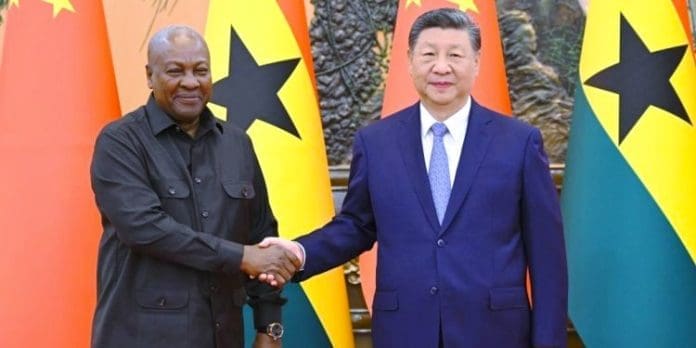President John Dramani Mahama met with Chinese President Xi Jinping on Tuesday at the Great Hall of the People, discussing expanded cooperation between the two countries as they mark 65 years of diplomatic relations. The meeting came during Mahama’s visit to Beijing for the Global Leaders’ Meeting on Women, a summit co-hosted by China and UN Women.
Xi emphasized China’s readiness to upgrade cooperation across various sectors with Ghana, including mining, energy, infrastructure, agriculture, and fisheries. He highlighted the importance of implementing outcomes from the 2024 Beijing Summit of the Forum on China-Africa Cooperation, suggesting both countries explore diversified cooperation models that could help Ghana convert its resource advantages into development momentum.
The Chinese president expressed hope that Ghana would soon benefit from China’s zero-tariff policy for African countries. China announced in September 2024 that it would provide 100 percent tariff line coverage with zero tariffs for all least developed countries maintaining diplomatic relations, including 33 African nations. The policy took effect in December 2024, making China the first major developing country and first major economy to implement such comprehensive duty-free access.
Ghana isn’t currently classified as a least developed country by the United Nations, which means it doesn’t automatically qualify for the zero-tariff treatment available to 33 African LDCs. However, Xi’s comment suggests China may be considering extending similar benefits to Ghana and potentially other African countries beyond the initial group. China later expanded its zero-tariff commitment to cover all 53 African countries with diplomatic ties, though implementation timelines vary.
Trade between China and Africa reached a record $295.56 billion in 2024, up 4.8 percent year-over-year, marking the 16th consecutive year China remained Africa’s largest trading partner. Since the zero-tariff policy launched, Chinese imports from African LDCs rose 15.2 percent through March 2025, with coffee imports surging 70.4 percent and cocoa bean imports increasing 56.8 percent in the first quarter alone.
Mahama congratulated China on successfully hosting the Global Leaders’ Meeting on Women, calling it significant and demonstrating China’s leadership in advancing women’s development worldwide. The summit brings together heads of state and government representatives from across the globe to discuss gender equality and women’s empowerment.
The Ghanaian president reaffirmed Ghana’s commitment to the one-China policy, a cornerstone of diplomatic relations between the two countries since 1960. He expressed interest in strengthening cooperation in trade, digital economy, infrastructure construction, energy, mining, and cultural exchanges. Ghana’s position on Taiwan remains consistent with the majority of African nations that recognize Beijing as China’s sole legitimate government.
Mahama emphasized Ghana’s commitment to multilateralism and the Global Governance Initiative, pledging to safeguard international fairness and justice. This alignment with China’s foreign policy priorities reflects broader trends in China-Africa relations, where Beijing positions itself as a champion of developing countries in global affairs.
Xi called for enhanced political mutual trust between the two nations, with both sides supporting each other on issues concerning their respective core interests and major concerns. This diplomatic language typically refers to backing each other’s positions on sensitive international matters, from territorial disputes to domestic governance approaches that face Western criticism.
Chinese Foreign Minister Wang Yi attended the meeting, underscoring the importance Beijing attaches to relations with Ghana. Wang has been instrumental in shaping China’s Africa policy and frequently participates in high-level meetings with African leaders visiting Beijing.
President Mahama and First Lady Lordina Mahama arrived in Beijing on October 11, receiving a grand reception that included bilateral talks beyond the women’s leadership summit. Foreign Affairs Minister Samuel Okudzeto Ablakwa was part of the Ghanaian delegation, indicating the visit’s diplomatic significance beyond the gender equality conference.
The timing of the meeting coincides with Ghana’s ongoing economic challenges. The country is working through an International Monetary Fund program after debt restructuring became necessary following fiscal pressures. Chinese investment and trade concessions could provide economic relief, though details of specific agreements or commitments from Tuesday’s meeting weren’t immediately disclosed.
Infrastructure development represents a major area of China-Ghana cooperation. Chinese companies have built roads, ports, and public buildings across Ghana, though some projects have faced criticism over debt sustainability and labor practices. The emphasis on diversified cooperation models suggests both sides recognize the need for arrangements that work better for Ghana’s economic circumstances.
Mining and energy cooperation takes on particular relevance given Ghana’s natural resources. The country produces gold, oil, and other minerals that could benefit from Chinese investment in extraction and processing. However, illegal mining by Chinese nationals has created tensions in Ghana, with authorities periodically cracking down on unlicensed operations that damage the environment.
Agriculture and fisheries cooperation could help address food security concerns in Ghana while providing Chinese companies access to agricultural products. China’s growing middle class creates demand for diverse food sources, potentially opening markets for Ghanaian farmers and fishing communities if quality and supply chain challenges can be addressed.
The digital economy emphasis reflects broader trends in Africa where Chinese technology companies like Huawei have become major players in telecommunications infrastructure. Ghana has embraced digital financial services and e-government initiatives where Chinese expertise and investment could accelerate development.
Cultural and people-to-people exchanges have expanded significantly between China and Ghana in recent years. Chinese language instruction has grown in Ghanaian schools, while more Ghanaian students pursue education in China through scholarship programs. These soft power investments help build long-term relationships beyond commercial transactions.
The 65th anniversary of diplomatic relations provides context for assessing how the partnership has evolved. Early ties focused on political solidarity among newly independent nations. Recent decades have seen the relationship become more economically driven, with Chinese investment and trade overshadowing the original ideological foundations.
Whether Tuesday’s meeting produces concrete results beyond diplomatic pleasantries depends on follow-through. High-level meetings between Chinese and African leaders often feature ambitious statements about cooperation that don’t always translate into specific projects or measurable outcomes. Implementation will determine if the upgraded cooperation Xi mentioned becomes reality.
Source: newsghana.com.gh










